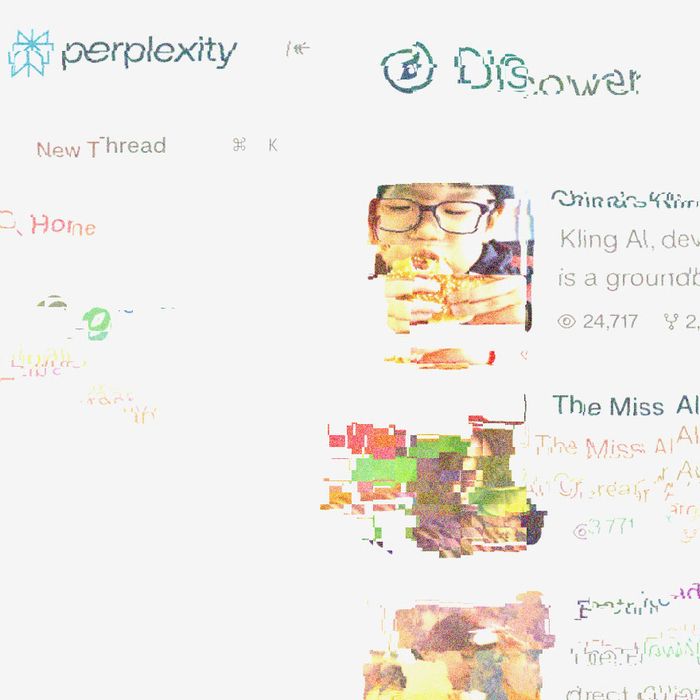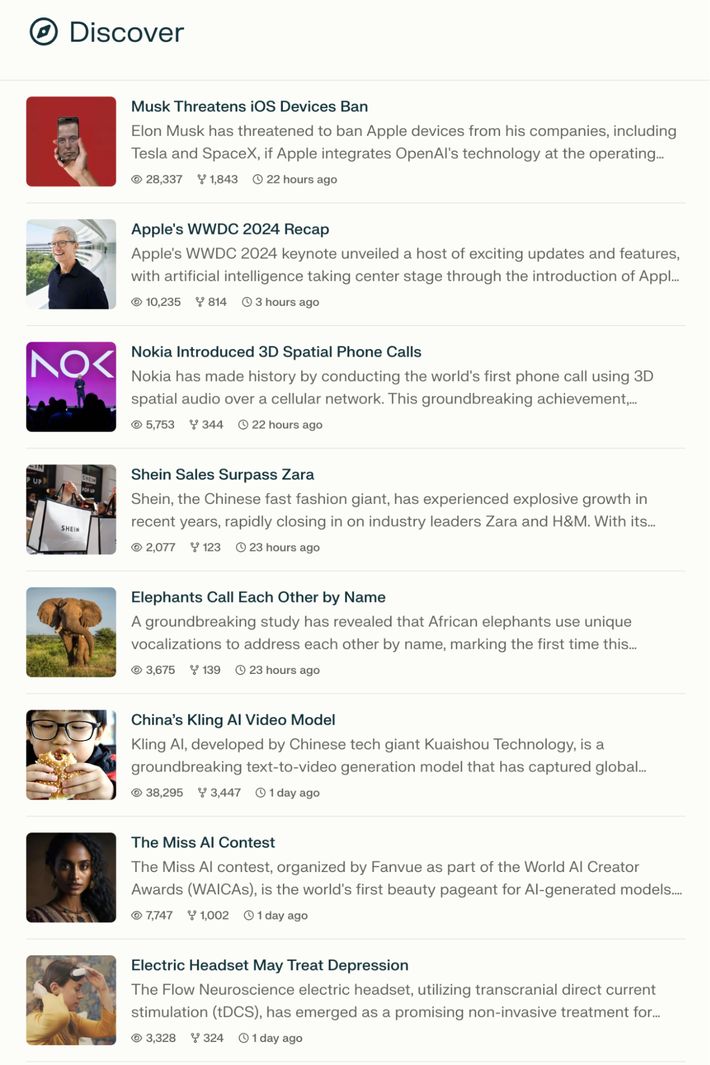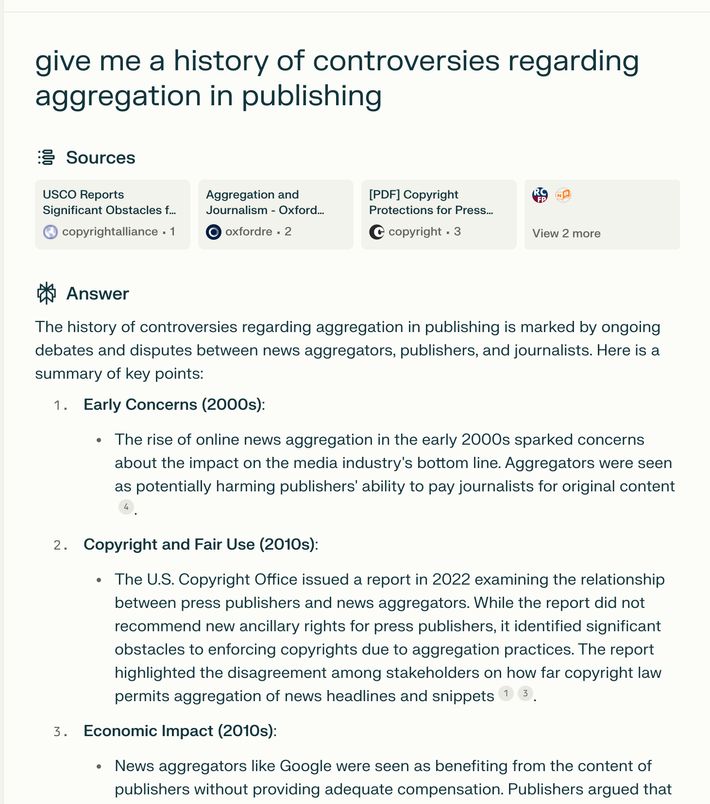
Picture-Illustration: Intelligencer; Picture: Perpelxity
In current months, Forbes has printed a sequence of deeply reported tales about Eric Schmidt’s stealth drone undertaking. They’re an enchanting window into the previous Google CEO’s budding new profession in Protection contracting — and you’ll learn them right here. Final week, reporters who labored on the tales reported one thing else: an AI-generated article-length abstract of their work. The publish contained sections of textual content copied verbatim from the paywalled Forbes tales, in addition to a evenly modified model of a graphic created by the Forbes design crew. It had been created with Perplexity Pages, a software not too long ago launched by the AI search engine of the identical title — a buzzy and widespread product with a billion-dollar valuation. The publish was featured on Perplexity’s Uncover web page, despatched out by way of push notification to its customers, included into an AI-generated podcast, and launched as a YouTube video. The article had garnered greater than 20,000 views, in keeping with Forbes, however didn’t point out the publication by title, as an alternative crediting the unique tales alongside different aggregations of their materials in a sequence of small, icon-size hyperlinks.
Forbes publicly objected, reporting that Perplexity “seems to be plagiarizing journalists’ work,” together with however not restricted to its personal. In a separate story, editor and chief content material officer Randall Lane made his place clear: “Perplexity had taken our work, with out our permission, and republished it throughout a number of platforms — net, video, cellular — as if it had been itself a media outlet.”
In response, Perplexity CEO Aravind Srinivas instructed Forbes that the Pages product has “tough edges” and that “contributing sources must be highlighted extra prominently.” In a later publish on X, he took a extra defensive place:
To anybody who has ever seen actual inner publishing metrics, this was an clearly absurd declare. Forbes reporter Alexandra S. Levine confirmed, in response, that in truth site visitors from Perplexity accounted for simply 0.014 % of holiday makers to Forbes — making it the “54th greatest referral site visitors supply when it comes to customers.” Perplexity is getting lots from Forbes, and Forbes is getting principally nothing again — a major downgrade from the already brutal preparations of search, social media, and cross-publication human aggregation. With pages, Perplexity wasn’t simply providing to summarize sources right into a Wikipedia-ish article for private consumption. The Pages characteristic is meant to “flip your analysis into shareable articles, serving to you join with a world viewers.” (The Forbes abstract was in truth “curated” by Perplexity itself.) It’s an try at automated publishing, full with an inner entrance web page and look at counts.
Illustration: Screencap
Pages isn’t Perplexity’s important product, however relatively a brand new characteristic that extends its primary premise. Perplexity is, to most of its customers, a Google different with a easy and interesting pitch: In response to queries, it offers “accessible, conversational, and verifiable” solutions utilizing AI. Ask it why the sky is blue, and it offers you a brief abstract of Rayleigh scattering with footnote hyperlinks to some reference web sites. Ask it what simply occurred with Hunter Biden, and it’ll let you know the president’s son “has been discovered responsible of mendacity on a firearm utility kind and unlawfully possessing a gun whereas utilizing medicine,” with footnoted hyperlinks to the Washington Submit (paywalled) and NBC Information (not).
Perplexity sometimes makes issues up or runs with a abstract based mostly on inaccurate assumptions, which is the primary downside with LLM-powered search-style instruments: The place typical serps merely fail to search out issues for customers or discover the fallacious issues, AI serps, or chatbots handled like serps, will generally simply fill the gaps with nonsense. By itself phrases, although, the product works comparatively effectively and has actual followers. Its interface is clear, it isn’t loaded with adverts, and it does a good job of answering sure types of questions a lot of the time. Its solutions really feel extra grounded than most chatbot responses as a result of they typically are. They’re not simply approximations of believable solutions synthesized from the residue of coaching knowledge. In lots of instances, they’re simple summaries of human content material on the precise net.
For individuals and corporations that publish issues on-line for enjoyable or revenue, Perplexity’s primary pitch can also be worrying. It’s scraping, summarizing, and republishing in a distinct context; to borrow a contested time period of artwork from publishing, it’s partaking in automated “aggregation.” As Casey Newton of Platformer wrote after the corporate introduced plans to include adverts of its personal, Perplexity, which is marketed as an AI search engine, will be additionally moderately described as a “plagiarism engine.” Automated publishing, in earlier contexts, is healthier identified by one other title: spam.
Once more, Perplexity is rising quick, elevating cash, and is valued at greater than a billion {dollars}. It has loyal customers who’re undeterred by the best way it really works, largely as a result of it typically does work — it’ll offer you one thing near what you’re asking for, rapidly. That Perplexity’s search responses are brief and offered individually leaves Perplexity with just a few believable defenses: It’s not a lot totally different from Google Search blurbs; it might conceivably ship guests to authentic content material; it’s kind of akin to a personalised entrance web page for the online populated with attractive blurbs; it’s no totally different from Wikipedia, which sources its materials from the world of others; it’s no totally different from low-value human aggregation, which many within the aggrieved media have been practising for many years. These defenses had been by no means terribly convincing. Perplexity encourages customers to ask follow-up questions, which leads it to summarize extra content material till it’s principally written a complete article anyway — as with chatbots, the product encourages customers to remain and chat extra, to not go away. They’re additionally defenses that Perplexity itself, at the least till not too long ago, didn’t see the necessity to mount.
Illustration: Screencap
In February, when the corporate was breaking by way of into the mainstream, I requested Srinivas, a former OpenAI worker, the place he thought Perplexity match into the already collapsing ecosystem of the open net. His responses had been candid and revealing. He described Perplexity as a distinct method not simply of looking out however shopping the online, significantly on cellular gadgets. “I believe on cellular, the app is prone to deprecate the browser,” he mentioned. “It reads the web sites on the fly — the human labor of shopping is being automated.” For many solutions, Perplexity would supply customers with as a lot data as they want on the primary strive.
I requested instantly how publishers who both rely on or are motivated by guests to their websites — to become profitable from them with adverts, subscriptions, or just to construct a constant viewers or group of their very own — ought to take into consideration Perplexity, and he instructed that such preparations had been principally out of date. “One thing like Perplexity ensures individuals learn your content material, however otherwise the place you’re not getting precise visits, but individuals get the related components of your area,” he mentioned. “Even when we do take your content material, the consumer is aware of that we took your content material, and which a part of the reply comes from which writer.”
I instructed this was exactly the priority of individuals whose content material Perplexity was counting on — that Perplexity’s unwitting content material suppliers can’t survive on credit score alone. Then Srinivas, who for a lot of the interview spoke thoughtfully and exactly concerning the state of AI and his firm’s technique for taking up Google, began pondering out loud as if encountering an attention-grabbing new downside for the primary time from a perspective he hadn’t beforehand wanted to think about. “We have to assume extra clearly about how a writer can monetize eyeballs on one other platform with out truly getting visits,” he mentioned. In a world the place readers encounter publications as citations on Perplexity or in Google’s AI solutions, “you’ll be able to argue model worth is being constructed much more. We must always determine a solution to measure, like, precise greenback worth that’s obtained from a quotation in a citation-like interface, in order that an advertiser in your area can nonetheless determine what to pay.”
There was no plan, in different phrases — as Perplexity sees it, this isn’t actually their downside to resolve, even when they’re serving to to create it. Within the AI-rendered future, publishing because it exists at this time is senseless. Positive, this era of AI instruments relies in a number of methods on scrapable public content material created below totally different cultural and business circumstances, but when the economic system of the online collapses, and companies like Perplexity don’t have a lot materials to summarize … effectively, they’ll cross that bridge after they come to it.
Within the time because the interview, Perplexity has launched Pages, instructed that it could get into promoting itself, and shifted its protection to speaking about site visitors that it doesn’t truly ship. The corporate isn’t alone on this method. Google’s AI overviews, which produce and cite content material in a trend much like Perplexity, have been equally criticized as plagiaristic and parasitic, to not point out generally manifestly fallacious. In response, Google, which (principally) efficiently fended off associated criticism for over-aggregation when it was comparatively younger, has claimed to an viewers of publishers that has no purpose to imagine it, and really a lot doesn’t, that its customers are truly very eager to faucet these little citations on its artificial summaries. On Wednesday, after the Forbes reviews, Perplexity positioned a narrative with Semafor that claimed it was “already engaged on revenue-sharing offers with high-quality publishers” on the time of the controversy and that it could unveil particulars quickly.
Perplexity’s about-face is at the least some kind of acknowledgment that there’s an issue, right here with penalties that might finally undermine not simply publishers however the AI corporations themselves. It helps clarify why OpenAI, which is each a a lot bigger firm and a much bigger goal for criticism and authorized motion than Perplexity however isn’t almost as entrenched as Google, has been pursuing offers with media firms, together with New York father or mother Vox Media, for each coaching on and displaying their content material. It additionally sheds some mild on why publishers, with some exceptions, have been so eager to simply accept its phrases: as a result of the longer term first envisioned by AI corporations didn’t embrace them in any respect.





